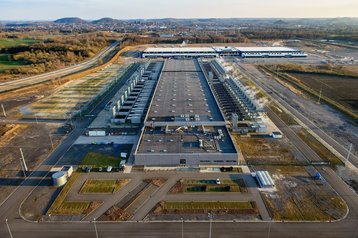You probably know Belgium for its beers and chocolates, but did you know that this tiny country nestled at the heart of Western Europe is also home to big tech firms and Google’s largest European data center? Maybe not. Time to focus on why digital giants from all around the world are going after Belgium to tackle the European market.
From industrial revolution pioneer to digital frontrunner
Wallonia, and particularly in the city of Charleroi, was at the forefront of the industrial revolution in the 19th and 20th centuries, where coal mining, steel and glass industries thrived for decades. Today, the Walloon Region is eager to mine its share of data gold, as data centers require the same resources as heavy industries like steel and coal: energy and water.
Conscious that it had the necessary resources to attract world operators, the Walloon Region has put the data center industry at the top of its priorities to accelerate its economic revival, enabling data centers to enjoy exceptional energy tax conditions and thereby imposing Wallonia as one of the most competitive countries in Western Europe.
"The digital world is constantly changing, and Belgium is becoming more and more attractive for big investors like Google,” said Belgium Prime Minister Charles Michel during a joint conference with Google earlier this year.
A competitive offer on all levels
With its exceptional location at the heart of Western Europe, Wallonia seems like the perfect location to serve Western European customers with very low latency. But that is obviously not the only factor data center operators are looking at when searching for the perfect site in Western Europe. So how does a small region like Wallonia compete with its larger neighboring countries?
According to trade agency Invest in Wallonia, the region's key selling points are its large sites (often over a hundred hectares, or a million square meters) with abundant power (up to 200 MW) free cold water, and good connections to high-speed fiber optic networks.
Several sites (both greenfield and brownfield) ranging from 16 to 140 hectares (or 160,000 to 1.4 million square meters (or 1.7m to 15m square feet) are indeed available for sale or rental at a very competitive price and offer the perfect characteristics for large-scale data center facilities. Several big airports all also within an hour drive, connecting companies to the rest of Europe and the world within a few hours.
Belgium also benefits from experienced local suppliers and skilled workers. They have developed a data center engineering Masters program and ensure they can create tailor-made training programs upon request to suit the investor’s need. In Charleroi, a tech education and entrepreneurship center should also open its doors in 2019 to boost local software engineering skills.
Why Google experts chose Wallonia
Data centers are the backbone of the Internet, housing the systems and equipment that make our connected world possible. And, according to Google experts, Belgium has the right combination of energy infrastructure, available land, and a local government-backed vision for how the Internet can bring economic benefits and jobs to the area.
“The Digital Innovation Valley project has created a cluster of high-tech businesses and put technology at the heart of the education system. As a result, we had a great team of people supporting investment in the area who were very helpful during our site selection process” said a Google representative about the company's Belgian site.
Since 2007, Google has invested heavily in its Walloon data center, with an additional €250 million ($283.8m) investment announced in February 2018. The facility is already one of the most energy-efficient Google data centers in the world, running entirely without refrigeration - thanks to an advanced cooling system that draws grey water from the nearby industrial canal - powered by the first solar farm ever built on a data center site.
Local authorities have confirmed entering discussions with several other big tech companies and data center players considering investing in Wallonia. So the question to ask now is who will be the next one to join Google in Belgium?





